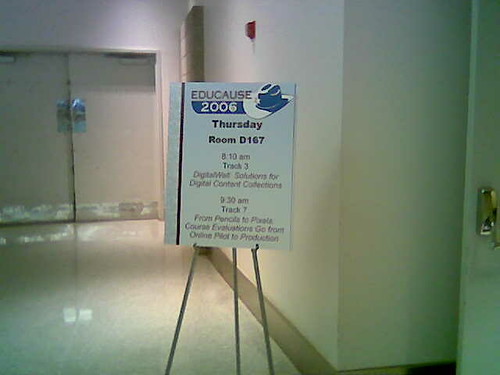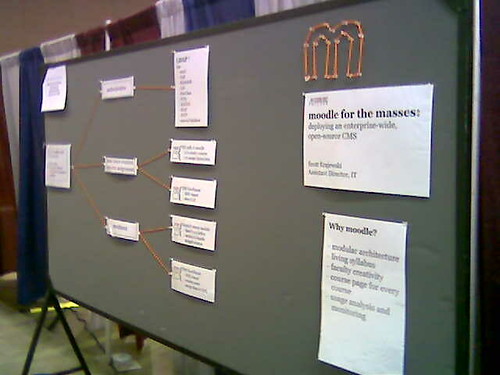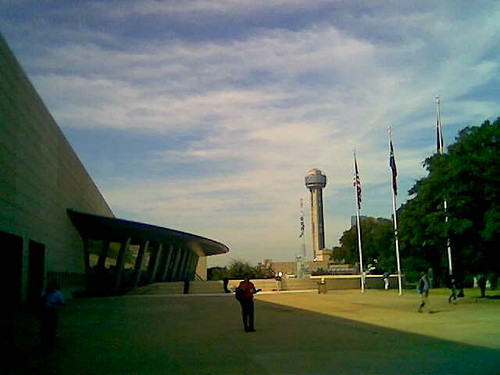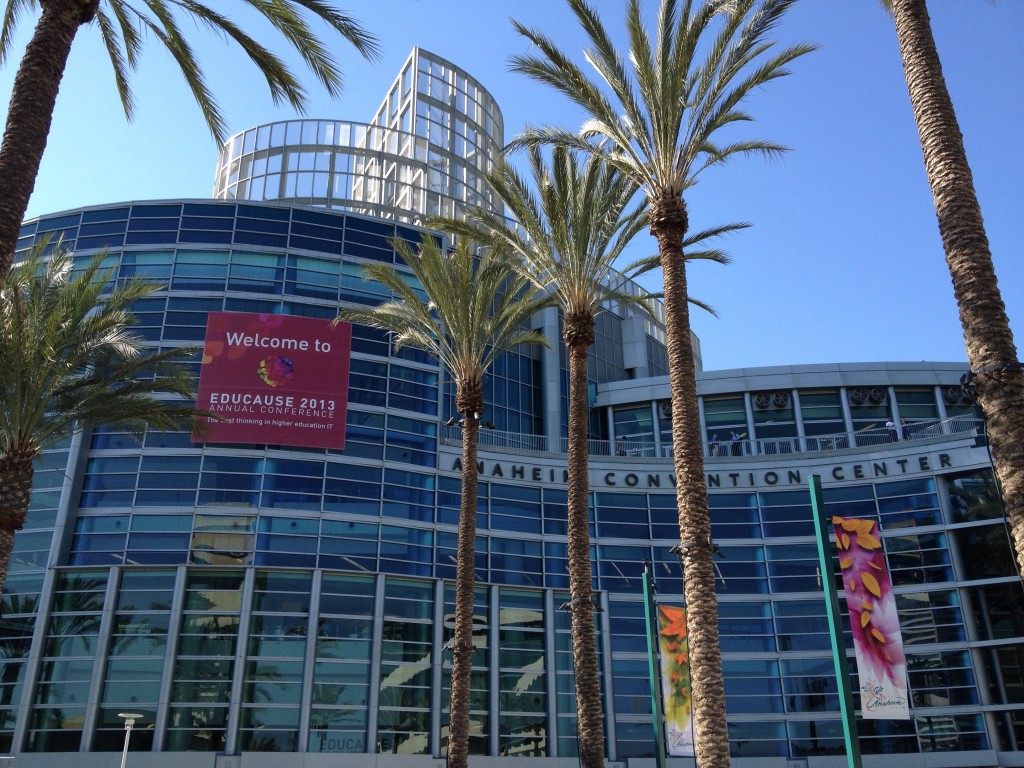Educause 2013 round up
Well another Educause annual conference has come and gone. It’s been a few years since I attended the annual conference so it was a joy to return. There were more sessions that I wanted to attend than I could attend. Several time slots had multiple presentations that I wanted to see. With more and more sessions recorded I can catch some of those later. My priorities this year were student success (retention/advising), analytics and vendors. We are implementing Hobsons Retain/AgileAdvisor/AgileGrad suite which includes a CRM (retain), case management advising (AgileAdvisor) and a degree planner (AgileGrad). I was also recently on the team architecting a reboot of our institutional research operation that will be the Office of Planning and Effectiveness so analytics are of particular interest.
Sir Ken Robinson
The conference kicked off with an entertaining and engaging talk by Sir Ken Robinson. This article captures much of the talk. The very telling video (below) shows one of his points, how you stifle innovation by asking the wrong questions.
[youtube=https://www.youtube.com/watch?v=9TskeE43Q1M]
(more…)
I’m a podcast now
The 2006 Educause sessions are now showing up as podcasts on the Educause blog site. If you dare, you can listen to my session here. I don’t know if you have the same reaction as I do to hearing a recording of yourself– but I had to stop listening after my first few sentences. It was painful. Next time I do an Educause it will be better.
Educause 2006 – day 3
The final day started out with another speaker’s breakfast since I was actually speaking. Breakfast is always tricky at Educause. Things start so early and there isn’t a breakfast provided but there is usually snack break mid-morning. The snack break on the last day tends to just be a coffee break which can leave people hungry.

I skipped the first session to review my material for my session, From Pencils to Pixels: Course Evaluations Go from Online Pilot to Production. I was a bit nervous of course! The session came (it was the last session of the conference before the final large general session) and I was surprised by the turnout. The room was about as far away from the main conference area (it was in section D of the center and most things were in A or B). But I had many people there, probably around 50 judging by how many handouts were left. I think I was a bit boring sounding and not as dynamic as I felt about the material. I was overly-concerned with people be able to understand me with the microphone (lapel clip-on). I’m not used to microphones so it was awkward. I was also tethered to the PA system so I didn’t feel that I could roam so well — I didn’t want to trip! But my slides went fast – 30 minutes – leaving much time for questions. There were A LOT of questions which was great and some people asked questions of other audience members. There was talk of a support group for people building their course eval systems instead of buying a package.
After that I did my podcast interview — still waiting for that to come online. I loved the podcasts last year. With that Educause 2006 was over and we headed to the airport to fly back to 30-40 degree weather from this sunny 70-80 degree weather!
Educause 2006 – day 2
Day 2 started with a presenter breakfast (because of my poster session!) and some rain if memory serves.
I then moved on to perhaps the best presentation I’ve seen in a while at 8:10 AM, Rules of Engagement: Strategic Moves with Technology. Jim Jorstad from UWL (where my mother teaches) gave a dynamic media-filled presentation touching on learning spaces, use of video, and more. It was so engaging I didn’t write much down! He touched on the key current learning space trends. He also showed some great uses of short video clips for education — a time-lapse of building construction. In addition he talked about video conferencing and conferenced-in his colleague from UWL to the session. I wish I had a video of the entire talk.
Next up at 9:30 AM was a general session The Acceleration of Technology in the 21st Century: the Impact on Education and Society with Ray Kurzweil. I didn’t take many notes on this one. He had a lot of graphs that all were showing the same trend (I can’t remember what that was now!). He was also able to predict the development of new technologies. The best part was when he demoed a hand-held camera/reader that can take a picture of something and read aloud the text to the user. Think how this will change the experience of the blind in the world. Text-to-speech tools exist now but are not this compact — you have to go somewhere to have things converted to audio. Imagine a blind person holding this up to a sign and then the sign text is read to them immediately.
Then came the 11:45 AM session, Tell Us What You Want: Lessons in Student-Centered Service Design. They had used different groups, a student outreach group and a student advisory group, to change their services. It had some good suggestions that are worth considering.
The Small Colleges group over lunch got a bit bogged down in the issue of printing. Basically with more things being posted online students are printing more. The usual cost of printing handouts is being moved from the departments to whoever pays for printing (sometimes the institution and sometimes the student). I left a bit early.
Next up at 2:20 PM was a “featured speaker” on From Today’s CMS to Tomorrow’s Learning Support System. You can see a video here. We had a few perspectives on CMS’s. First up was a student with her view on the net gens. Then we had a great exploration of the web 1.0 to web 2.0 move with regards to the CMS. Web 1.0 is a teaching paradigm whereas web 2.0 is a learning paradigm. “CMS 2.0” opportunities were noted: tagging and bookmarking, content management (beyond faculty), collaborative team tools, themes – not courses, peer tutoring collaborations, facebooks not portals, social note taking. Great stuff. I had to leave a bit early to set up my poster session.
I was briefly in the 3:55 PM session, Fear Factor and American Idol: Leveraging Popular Culture for Student Support. I thought I could get enough from the session materials and had to go to my poster session afterwards. Basically during their first year experience course they did some fear factor-like (very safe though) technology challenges on identity theft, securing your computer, copyright, and using their campus resources. I’d like to get more of a presence in our first year experience course too.
After this was my poster session, Moodle for the Masses: Deploying an Enterprise-Wide, Open-Source CMS. I ran out of handouts (I had 70 I think!) and talked non-stop to people. There were many good questions and interest in moodle is still very high. I found some moodle-colored yarn before leaving for the conference to create the links in my poster “diagram” as well as make a moodle “m” to get attention.

Tonight was the Taste of Texas event and tomorrow was my presentation so I turned in early. The event was very Texas-themed as you can see from this flickr picture I found. The food was good.
Educause 2006 – day 1
Here I go with some reflections on the conference. You can find a lot of pictures on flickr to get a sense as to what the event looked like.

The first day opened with a big general session, Uncovering the Science in Computer Science: Challenges for the 21st Century – Vinton G. Cerf. He had an interesting outfit (captured here by this guy who was blogging 2 rows in front of me) that only reinforced my impression of him as a cooky (meant in the warmest way) computer science professor. He talked about how computer storage and processing power has grown exponentially but programming speed has not had nearly as great a multiplier. Towards the end he came to his focus of how sputnik gave the big push to K-12 science and technology education (not to mention the creation of the internet) and now global warming is the next sputnik. The global warming crisis should spur another K-12 push and more computing power is needed for simulations. After that he had a little sidenote about an Interplanetary Internet that really blew my mind. He’s working on protocols to allow satellites to act as network nodes for transfering data (packets) through space. With 4 satellites around Mars we’ll have a 2-planet Internet eventually.
Providing a nice bookend to my talk on Thursday, I attended Student Evaluations: A Comparison of Online vs. Paper Data Collection at 10:30 AM. This was a comparison done at the U of M just next door to Augsburg! I was reassured as they found similar trends that we have. Their 4 questions were:
- Is the completion rate different?
Uh, yes. 55.9% online vs 76.7% paper in their 314 course pairs. - Is there a difference in distributions?
Yes, but…. On their 7-point scale they had more 1,2,3 and 7s online. But just a little more. The distributions still look the same. The middle wasn’t completely absent, just a little absent. - Is there a difference in average ratings?
No significant difference in means. - What are the common perceptions of each format for faculty and students?
Using focus groups they heard typical comments. Check their resources for more details.
This is a good study to add to anyone’s list of resources.
Next up at 11:40 AM was From Labs to Collaborative Spaces: Development of Temple University’s TECH Center. This was a huge consolidation of 120 labs throughout the instituion. There was a lack of classroom spaces and rooms needed to be reclaimed. The resulting space is awesome. The Teaching & Learning Center, an “ask a librarian” service, as well as Admissions is housed there. For students there is a 24-hour help desk, a cyber cafe 13 breakout rooms, 6 specialized labs. In total there are 600 desktops and 100 laptops in the space. It’s been a big hit for recruitment as well as the prime spot for students to work all hours of the day. You can see more at http://www.temple.edu/cs/techcenter/. It really addresses the needs of an urban institution with a large non-resident population. It gets me thinking about how we address the needs of our non-resident students.
The afternoon brought the 2:15 PM session The Changing Place of Space. The now well-known Emory University Cox Hall project is used to provide guidance to Emory’s next building project. The session gave some good suggestions — combining curricular and co-curricular activities, quality matters, it takes a campus to support learning spaces, establish standards, focus on everything. They have many pictures on flickr.
Before poster sessions, the day wrapped up with a 3:50 PM session Letting Go of ResNet. Three small colleges (2 with old old residental networks) contracted with Apogee to run their residential networks. Though it did feel like a bit of an ad for Apogee, the colleges did find their staff could now focus on issues really about education. Students get a free basic bandwidth service (64 kbps) to the internet but could upgrade speeds for a cost. They get a fat pipe (100 mbps) to campus resources for free too. It does look attractive as resnet is becoming a bigger and bigger distraction to IT departments. However it is not cheap — Apogee’s website notes $3-$20 / bed / month. But once you calculate the staff time spent (by multiple fulltime staff) on resnet issues it might not seem so bad.
